英语人教版七年级下册How was your school trip
七年级英语下册Unit 11 How was your school trip超全重要短语和句子(英汉対译)
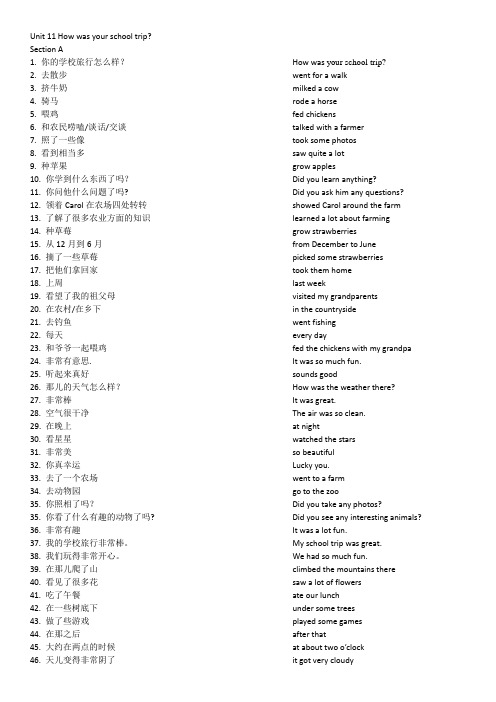
Unit 11 How was your school trip?Section A1. 你的学校旅行怎么样?How was your school trip?2. 去散步went for a walk3. 挤牛奶milked a cow4. 骑马rode a horse5. 喂鸡fed chickens6. 和农民唠嗑/谈话/交谈talked with a farmer7. 照了一些像took some photos8. 看到相当多saw quite a lot9. 种苹果grow apples10. 你学到什么东西了吗?Did you learn anything?11. 你问他什么问题了吗? Did you ask him any questions?12. 领着Carol在农场四处转转showed Carol around the farm13. 了解了很多农业方面的知识learned a lot about farming14. 种草莓grow strawberries15. 从12月到6月from December to June16. 摘了一些草莓picked some strawberries17. 把他们拿回家took them home18. 上周last week19. 看望了我的祖父母visited my grandparents20. 在农村/在乡下in the countryside21. 去钓鱼went fishing22. 每天every day23. 和爷爷一起喂鸡fed the chickens with my grandpa24. 非常有意思. It was so much fun.25. 听起来真好sounds good26. 那儿的天气怎么样?How was the weather there?27. 非常棒It was great.28. 空气很干净The air was so clean.29. 在晚上at night30. 看星星watched the stars31. 非常美so beautiful32. 你真幸运Lucky you.33. 去了一个农场went to a farm34. 去动物园go to the zoo35. 你照相了吗?Did you take any photos?35. 你看了什么有趣的动物了吗? Did you see any interesting animals?36. 非常有趣It was a lot fun.37. 我的学校旅行非常棒。
初中英语 七年级下册 Unit11How was your school trip

the trip the train
the museum
the gift shop and gifts
Helen
exciting fast
really interesting
lovely, not expensive
Jim terrible slow
big, boring, dark, too many people
2. Learn about Helen’s and Jim’s diary entries. 3. Learn to write diaries with past tense.
Lead-in
Look at the pictures and talk —I +v-ed(went to …)/ —It/That sounds…
The museum was big and boring. Everything was
about robots and I’m not interested in that.
be interested in… 对……感兴趣
hear v. 听到;听见。 用法:hear sb. do sth. 听到某人做 某事(全过程)hear sb. doing sth. 听到某人正在做某事
✓ 特殊疑问词+不定式结构可改写成由该疑问词 引导的宾语从句,改写时在疑问词后加主语 (与主句主语一致),将不定式改成“should+ 动词原形”作谓语。
You have to consider what to do next. =You have to consider what you should do next.
总的来说,相当于in a word或in short.
人教版七年级英语下册Unit11Howwasyourschooltrip单元复习
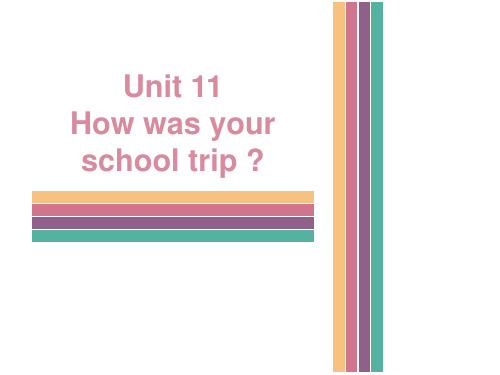
2.__ta_k_e_____ 4.__h_a_d_____ 6._r_o_d_e_____ 8.__b_u_t_____ 10.__a_______
基础复现天天练 Work seriously
●难点释疑 ①go on a school trip意为“参加学校郊 游”。如: All the students went on a school trip last week. 上周所有学生都参加学校郊游活动。 ②worry是动词,意为“担心”。常见一般 搭配为 worry about。如: You don’t need to worry about me.
目录 contents
4 主要语法
主要语法
Work seriously
四、主要语法 用一般过去时询问或描述过去事 件及关感受
★询问对过去事件的感受: 1.—How was your school trip? —It was great. ——你的学校旅行怎么样?——很好。 2.—Were the strawberries good ? —Yes, they were. ——草莓好吃吗?——是的,好吃。
Life on the farm was so much 8 .We went fishing in the early morning, went 9 a walk after
基础复现天天练 Work seriously
supper and watched the 10 at night when the weather was fine.They were very beautiful.
Have 10 nice day! Write to me if you can.
Yours, Lily
初中英语 七年级下册 Unit11 How was your school trip

练习:判断下列句子是否用一般过去时。 I got up at six thirty yesterday morning. He had a good time last summer? He was there five minutes ago. The little girl was born in 2008. When Tony was young, his parents passed away. I saw him at the gate of the school just now.
reply on the right.
Dear Bill, How _w_a_s_ (is) your school trip yesterday? _D_i_d_ (Do) you _g_o_ (go) to the zoo? _D__id__ (do) you take any photos? _D_i_d_ (Do) you _s_e_e_ (see) any interesting animals? I _w_e_n_t_ (go) to the zoo last year and it _w_a_s_ (is) a lot of fun. Jim
类别 中间去e,词尾加t
词尾的d变成t 过去式以ought/ aught结尾 be动词的过去式
例词 keep→kept feel→felt sleep→slept spend→spent send→sent lend→lent think→thought teach→taught buy→bought
We _a_t_e_ (eat) our lunch under some trees and _p_la_y_e_d_ (play) some games after that. But at about two o’clock, it _g_o_t (get) very cloudy and we _w_o_r_r_ie_d_ (worry) it would rain. Luckily, it _d_id_n__’t_ (do not), and the sun _c_a_m__e_ (come) out again!
Unit11单元知识点归纳总结及配套练习-人教版英语七年级下册

Unit11 How was your school trip?Ⅰ. Revision(复习)Ⅱ. Presentation(重点,难点,考点,热点呈现)一般过去式1. 含义:表示动作或者状态发生在过去2.构成:肯定句:主语+动词过去式+ 其它如:I went home at nine o'clock yesterday.否定句:主语+didn't +动词原形+其它如:I didn't go home yesterday. He didn't tell me about you.疑问句:一般疑问句:Did +主语+动词原形+宾语如:Did you go home yesterday?Did you study in the school?肯定回答:Yes, I did. 否定回答:No, I didn't.特殊疑问句:特殊疑问词+did +主语+动词原型+宾语When did you finish your homework last night? What did you do the day before yesterday?3. 一般过去时态动词变化形式一般过去时态由动词的过去式表示。
大多数动词的过去式是在动词原形后加上ed构成。
这类动词称为规则动词。
1)一般情况下在词尾直接加ed。
如:play―played work―worked2)以e结尾的动词只加d. 如:like--- liked love―loved3)以辅音字母+Y结尾的动词,变Y为i,再加ed. 如:study―studied carry―carried 4)以重读闭音节结尾的动词,如果末尾只有一个辅音字母,要双写最后这个辅音字母,再加ed.如:stop―stopped5)不以ed 结尾的过去式,称为不规则动词,如:write --wrote go-went do-did have-had see-saw take-took make-made come-came buy-bought4. 标志词。
新人教版七年级英语下册Unit 11 How was your school trip Sectio

1b. Listen and answer the questions.
4.How to ……疑问句+不定式? They want to know how to make a model plane? 他们想知道如何制作飞机模型?(报纸) 5.take photos=take pictures照相 take a photo /photos of sb 给某人拍照 6.buy——过去式:bought 买 buy sb sth =buy sth for sb 给某人买某物 buy some lovely gift for my parents。 点睛:p74 7. lovely 形容词:可爱的 报纸:Helen has a lovely dog and she likes it very much。 Helen 有一个可爱的狗狗,她非常喜欢它。
2.It is +adj+to do sth 做某事很怎么样。 3.any 用于否定句,此句有didn’t)
(7)There were also too many people and I couldn’t really see or hear the guide. (人也太多而且我也不能看见或听见向导说的 话。)
expensive
3a. Look at the pictures of Bob’s school trip. Complete his diary entry.
最新人教PEP版七年级下册英语Unit 11 How was your school trip?-文化背景资料

英语国家学校的school trips
若查词典,trip为“旅行;行程;旅游”之意。
在汉语言文化背景下的我们看来,trip 仅与户外游览相关,实则不然。
英美等国的中小学校每学期都会组织大量的校外游览和体验等活动,他们把所有走出校外的活动统称为school trips。
这些school trips或远或近,时而徒步,时而借助交通工具前往目的地,有些在室外,有些在室内。
纵观这些school trips,大致可分为以下三类:
1 )郊游观光
这种活动接近我国中小学校组织的“春游”或“秋游”,师生到郊外或景区、公园等地亲近自然、放松身心,调剂学校学习所带来的压力。
2)参观各类博物馆
英美等发达国家各个城市,无论大小,都有许多各类国立或地区性博物馆、科技馆、展览馆,且所有这些公立机构均实行免费参观制度,这就成为学校对学生进行各类文化和科学教育的好场所,因此学校会有计划地安排学生大量参加这样的“校外课堂”(school trips)生活。
当今,许多发达城市的私立博物馆、展览馆及音乐厅也愈来愈多地参加到学校社会教育的行列中来,免费或以低廉的学生集体票价位配合学校开展这样的school trips。
例如美国波士顿音乐厅每一学期及音乐演出季就推出若干学生专场音乐会,向学校提供更多组织school trips的机会,以此来推动古典音乐在青少年中的普及。
3)参加社会实践活动
组织学生参加社会实践活动也是中小学校school trips的重头戏。
这些
活动包括访问养老院、参与公益或慈善机构的活动、参观大学或研究机构、参加街道宣传等。
2023年人教版七年级英语下册《Unit 11 How was your school trip》句
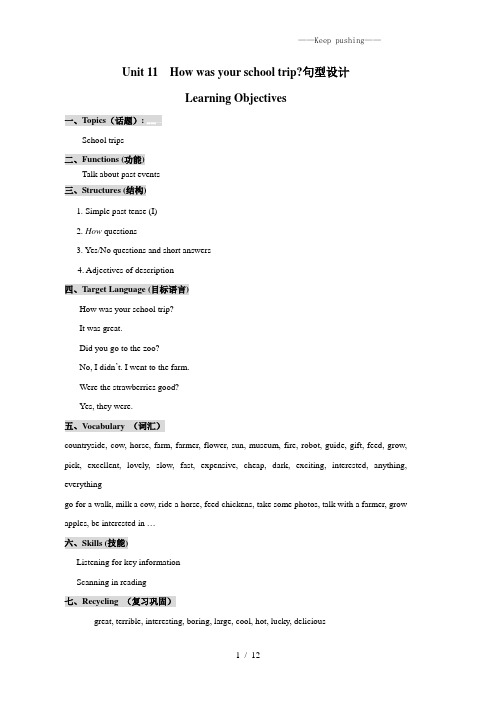
Unit 11 How was your school trip?句型设计Learning Objectives一、Topics(话题):School trips二、Functions (功能)Talk about past events三、Structures (结构)1. Simple past tense (I)2. How questions3. Yes/No questions and short answers4. Adjectives of description四、Target Language (目标语言)How was your school trip?It was great.Did you go to the zoo?No, I didn’t. I went to the farm.Were the strawberries good?Yes, they were.五、Vocabulary (词汇)countryside, cow, horse, farm, farmer, flower, sun, museum, fire, robot, guide, gift, feed, grow, pick, excellent, lovely, slow, fast, expensive, cheap, dark, exciting, interested, anything, everythinggo for a walk, milk a cow, ride a horse, feed chickens, take some photos, talk with a farmer, grow apples, be interested in …六、Skills (技能)Listening for key informationScanning in reading七、Recycling (复习巩固)great, terrible, interesting, boring, large, cool, hot, lucky, delicious八、教材分析本单元的话题是谈论学校郊游,要求学生学会使用一般过去式讲述过去发生的事情,学会用一般过去时写日记。
2020年人教版七年级英语下册Unit11 How was your school trip 要点详解
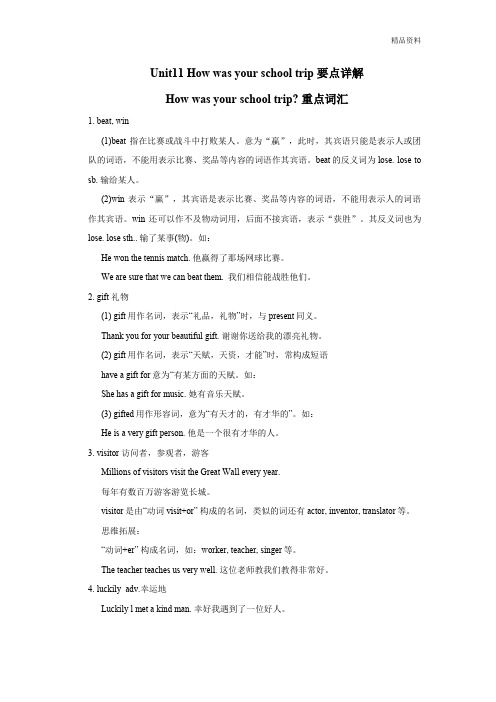
Unit11 How was your school trip 要点详解How was your school trip? 重点词汇1. beat, win(1)beat指在比赛或战斗中打败某人。
意为“蠃”,此时,其宾语只能是表示人或团队的词语,不能用表示比赛、奖品等内容的词语作其宾语。
beat的反义词为lose. lose to sb. 输给某人。
(2)win表示“赢”,其宾语是表示比赛、奖品等内容的词语,不能用表示人的词语作其宾语。
win还可以作不及物动词用,后面不接宾语,表示“获胜”。
其反义词也为lose. lose sth.. 输了某事(物)。
如:He won the tennis match. 他赢得了那场网球比赛。
We are sure that we can beat them. 我们相信能战胜他们。
2. gift 礼物(1) gift用作名词,表示“礼品,礼物”时,与present同义。
Thank you for your beautiful gift. 谢谢你送给我的漂亮礼物。
(2) gift用作名词,表示“天赋,天资,才能”时,常构成短语have a gift for意为“有某方面的天赋。
如:She has a gift for music. 她有音乐天赋。
(3) gifted用作形容词,意为“有天才的,有才华的”。
如:He is a very gift person. 他是一个很有才华的人。
3. visitor 访问者,参观者,游客Millions of visitors visit the Great Wall every year.每年有数百万游客游览长城。
visitor是由“动词visit+or”构成的名词,类似的词还有actor, inventor, translator等。
思维拓展:“动词+er”构成名词,如:worker, teacher, singer等。
The teacher teaches us very well. 这位老师教我们教得非常好。
人教版七年级下册英语Unit11
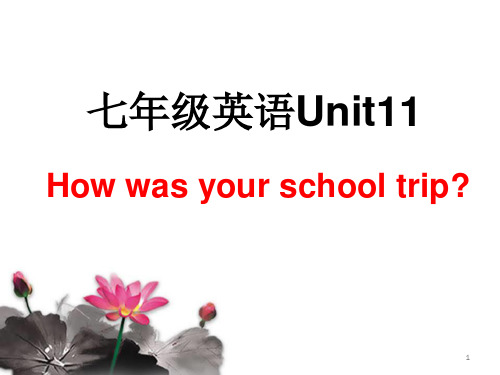
ቤተ መጻሕፍቲ ባይዱ
精讲知识点
知识点1:一般过去时的用法 表示_过__去__某个时间发生的_动__作__ 或_存__在__的__状__态_,常
和表示过去的__时__间___状__语____连用. 标志词:y_e_s__te_r_d__a_y_, _la__s_t n__ig__h_t__, t_w__o__d_a_y__s__a_g_o
man , and then he showed us _C____ his old house
happily.
A. to ; to
B. with ; around
C . to ; around D . with ; to
解析:show sth. to sb. 给某人看… Show sb. around … 领某人参观… 7
箱)。
A. tomatos ; milk B. tomatos ; milks
C. tomatoes ; milk D. tomatoes ; milks 5
知识点二 短语 1
1去散步 go__f_o_r_a__w__a_l_k______ 2给奶牛挤牛奶__m__i_l_k__a___c_o_w___ 3骑马___r_i_d_e__a__h_o__rs__e__________ 4喂鸡__f_e_e_d__c__h_i_c_k_e_n__s_________ 5与......谈话__t_a_l_k__w__i_th___s_b__. ___ 6拍照 _ta__k_e__p__h_o_t_o__s_________ 7相当多;许多___q__u_it_e__a__l_o_t___ 8带领......参观_s_h__o_w__.._.._._.a__ro__u_n__d 9了解 ____l_e_a_r_n__a__b_o_u__t_________
人教版pep英语七年级下册-Unit-11-单元分析

比分析能力。
品店的东西很贵。
分课时教学目标
课时 period 1
period 2
Period 3 Period 4
Period 5
分课时教学目标
学生能够: 1.了解卡罗尔在旅行中做了什么的详细信息,并复述卡罗尔的 旅行经历; 2.正确使用目标语言进行关于旅行的对话。
1.获得埃里克、简和托尼旅行的详细信息; 2.用目标语言复述和谈论这些旅行; 3.从更多方面分享我们自己的旅行,并思考我们可以从旅行中 得到什么。
作业设计 根据农场旅行vlog编写对话(学习理解+应 用实践) 描述自己的一段令人难忘的旅行经历(应 用实践+迁移创新)
利用静态雕像进行故事接龙(应用实践+迁 移创新)
按要求编写和Jim的对话(应用实践+迁移 创新)
写一篇旅行日记(应用实践)
教学内容 语篇类型
Period 4
2b两篇日记 (应用文)
What
Why
How
Helen和Jim的日记,记录了 2b两篇日记是两个人 因为是日记体裁,所以这两
对待同一场学校旅行两人不 对同一场学校旅行截 个语篇均使用第一人称和一
同的感受和评价。
然不同的记录与感受。 般过去时按照旅行发展的顺
Helen认为参观科学博物馆 启发学生对于看待事 序去展开描述,Helen与Jim
行很糟糕,觉得火车很慢车 写作。
lovely, exciting,
厢里面很热,博物馆大且无
terrible, hot, boring等
趣,因为他对机器人不感兴
形成的对比,这不仅考查了
趣。馆内很暗所以他没拍照。
学生对篇章的理解,培养了
而且人很多,他看不清也听
人教七年级英语下《Unit11HowwasyourschooltripPeriod4》
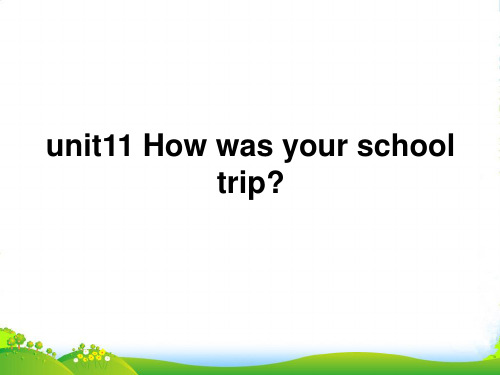
5. My father often
(swim)in this river when he was
young.
答案: 1. was 2. Were 3. visited 4. rode 5. swam
Ⅱ. 句型转换
1. She was a dancer 10 years ago. (改为否定句)
She
的消息时, 每个人激动不已。excited人感到兴奋, 修饰人;
exciting令人兴奋的, 指物体令人兴奋, 修饰物, 故选B。
【习作在线】 四练笔巩固--1师友练笔
请根据下表提示, 以“A Great School Trip”为题写一篇
英语短文, 介绍七年级一班去泰山(Mount Tai)校游的情况。
3. 昨天他参加了学校旅游。
He
a school trip yesterday.
4. 母亲教我如何做早饭。
My mother
me
cook breakfast.
5. 他一点也不喜欢这次旅行。
He
like the trip
.
答案: 3. went on 4. taught; how to 5. didn’t; at all
19. along the way 沿线
20. after that 之后 21. buy sth. for sb. 为某人买某物
22. all in all 总的来说 23. take a / the train 乘火车
一、知识回顾 ---2. 教师点评
【语法总结】一般过去时 (一)一般过去时的定义 一般过去时表示过去某个时间发生的动作或存在
→
(adv. )幸运地; 好运地
7. paint(v. )
人教版七年级英语下册 Unit11How was your school trip_重点知识点
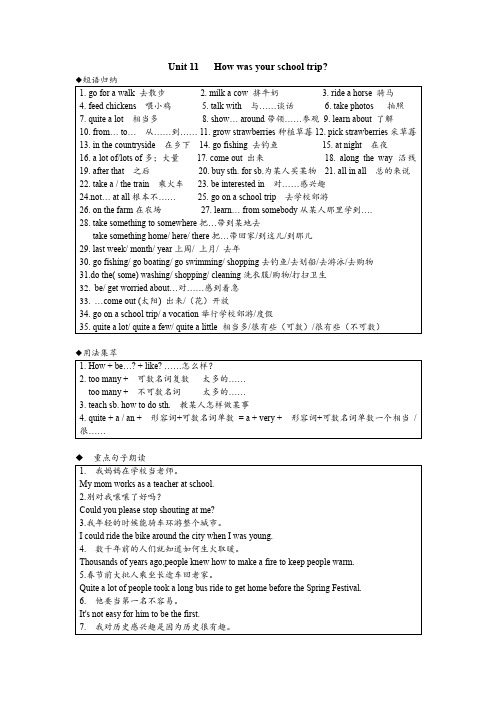
18.乘火车我们很快就到了那儿。
We got there so fast by train.
19.沿途我们看见了些农场和村庄。
We saw some farms and villages along the way.
20.我不知道它们还有本事和我们下棋。
◆用法集萃
1. How + be…? + like? ……怎么样?
2. too many +可数名词复数太多的……
too many +不可数名词太多的……
3. teach sb. how to do sth.教某人怎样做某事
4. quite + a / an +形容词+可数名词单数= a + very +形容词+可数名词单数一个相当/很……
4.数千年前的人们就知道如何生火取暖。
Thousands of years ago,people knew how to make a fire to keep people warm.
5.春节前大批人乘坐长途车回老家。
Quite a lot of people took a long bus ride to get home before the Spring Festival.
22. take a / the train乘火车23. be interested in对……感兴趣
24.not… at all根本不……25. go on a school trip去学校郊游
26.on the farm在农场27. learn… from somebody从某人那里学到….
28. take something to somewhere把…带到某地去
人教版七年级下册英语 Unit 11 基础知识单词、短语、句子默写版

Unit 11 How was your school trip? A部分重点单词★根据汉语提示默写出下列单词1.挤奶v.2.奶牛n.3.马n.4.喂养;饲养v.5.农民;农场主n.6.相当;完全adv.7.任何东西;任何pron.8.种植;生长;发育v.9.农场n. 务农;种田v.10.采;摘v.11.极好的;优秀的adj.12.乡村;农村n. 13.昨天adv.14.花n.15.担心;担忧v.&n.16.幸运地;好运地adv.17.太阳n.★写出下列单词变形1.come⎼______________(过去式)2.get⎼______________(过去式)3.do⎼______________(过去式)4.grow⎼______________(过去式)5.eat⎼______________(过去式)6.feed⎼______________(过去式)7.ride⎼______________(过去式)8.farm⎼______________ /______________(名词)9.is/am⎼______________(过去式)10.worry⎼______________(过去式)11.take⎼______________(过去式)12.see⎼______________(过去式)13.have⎼______________(过去式)14.buy⎼______________(过去式)15.go⎼______________(过去式)16.lucky⎼______________(副词)17.are⎼______________(过去式)重点短词★根据汉语提示默写出下列短语1.给奶牛挤奶2.在乡下;在农村3.骑马4.和某人交谈5.问某人问题6.种植苹果7.从…到…8.看望某人9.吃某人的午饭10.(太阳、月亮或星星)出现11.许多12.去散步13.喂鸡14.拍照15.带领某人参观…16.学习…有关…17.摘草莓18.去钓鱼19.在树下重点句子★根据汉语提示默写出下列句子1.—上周你的旅行怎么样?—棒极了。
人教版 七年级英语 下册 Unit_11_How_was_your_school_trip

2d Role-play the conversation.
巧记一般过去时
动词一般过去时,表示过去发生事; be用was或用were, have, has变had; 谓语动词过去式,过去时间坐标志; 一般动词加-ed,若是特殊得硬记。 否定句很简单,主语之后didn’t添; 疑问句也不难,did放在主语前; 如果谓语之前有did,谓语动词需还原; 动词若是was,were,否定就把not添。
to June. T F
4 The farmers don’t grow apples. T F
5 Carol picked some strawberries
and took them home.
TF
2c Ask and answer questions about Carol’s visit to the farm. A: What did Carol do? B: She picked some strawberries.
Unit 11
How was your school trip?
Phrases
milk a cow
go for a walk ride a horse
talk with a farmer
pick strawberries
feed chickens
take some photos
visit my grandparents go fishing
2021年1月18日
13
2一般过去时的结构:
(1).主系表 S+was/were+P (2).主谓(宾)S+Ved+(O) (3).There be There was/were+某人、某物+某地、某时
- 1、下载文档前请自行甄别文档内容的完整性,平台不提供额外的编辑、内容补充、找答案等附加服务。
- 2、"仅部分预览"的文档,不可在线预览部分如存在完整性等问题,可反馈申请退款(可完整预览的文档不适用该条件!)。
- 3、如文档侵犯您的权益,请联系客服反馈,我们会尽快为您处理(人工客服工作时间:9:00-18:30)。
Section B (1a-1d)
zuo chun
Words and expressions
museum
fire painting exciting
lovely expensive
cheap
slow 博物馆
火灾
油画;绘画
使人兴奋的
可爱的
昂贵的
廉价的
缓慢的;迟缓的
My Last Trip
climbed a mountain The weather was cloudy
went to the zoo had dinner
It was an exciting day
visited a museum(great)
rode a horse(terrible)
What did he/she /they do last school trip?
He/She/They+V-ed.....
How was the trip?
It was....
went to the zoo(fun)
visited a fire station (cool)
climbed a mountain (boring)went fishing (interesting)What did he/she /they do last school trip?He/She/They+V-ed .....
How was the trip?
It was ....
1a Match the activities with the pictures.
1. go to the zoo __
2. visit a museum __
3. ride a horse __
4. climb a mountain __
5. visit a fire station __
6. go fishing __a c b e d f went went
visited rode climbed visited
Jane Tony 1b Listen and answer the questions.
1. How was Jane’s trip?
___________________________________
2. How was Tony’s trip?
___________________________________It was terrible.It was great.
1c Listen again. What did Jane and Tony do on their last school trip? Check Tony or Jane.
√
went to
the countryside climbed
a
mountain
went to
an art
museum
saw
some
paint
ings
drew
pictures
Tony
Jane√√
√√√
Tony :___________your school trip, jane?Jane : oh, it was ______.Tony : really? _______did you go?
Jane : well, we ________the countryside and climbed a mountain. but the _______was so cold. it ______and ______all day long.
Tony : oh, that's too bad.
Jane : ugh! __________your school trip, tony?
Tony : well, it __________here too, so we didn't go to the countryside How was
terrible
Where went to
weather rained rained How about was raining
Jane :so what did you do then?
Tony : we went to an art museum. it was great. there ______
so many interesting things to see. I ______some really beautiful
paintings. then we _________
at the museum restaurant. the food was really
_______! after that, we went to a special art
room and __________. it was so much fun!
Jane:sounds like you ______
a great school trip.
Tony: yes. we had a really good time!
were saw had lunch delicious drew pictures had
A: Hello! Can I ask you some questions.
B: Sure.
A:What did you do last school trip?
B:I went to a farm on my last school trip.
A: That sounds great.
A: How was your school trip?
B: It was __________
A: How was the food there?
B: It was _____________
A: How was the weather?B: It was ___________interesting difficult lovely slow
exciting boring cool hot
lucky large expensive terrible
delicious great cheap fast 要求:四人一组,其中一人对其他三人上次旅行做采访,最后形成口头报告。
1. 你上次的足球比赛怎么样?
_____________________________________"How + was / were + 主语?"用来询问对方对某
物的看法。
如:How was the weather there?
那儿的天气怎么样?
How was your trip last week?
你上周的旅行怎么样?
How was your last football match?
2. 我们上周五游览了动物园。
We _______ the zoo last Friday.A. visit B. went C. went to
注意visit 是及物动词,之后直接跟名词作宾
语,但是go 是不及物动词,之后必须跟介词
之后才能跟名词作宾语,如果跟副词作宾语
时不要介绍。
类似的动词有get ( to + n.) / adv. ,
arrive (in /at + n.) / adv.。
C
1. A: Where did you go on vacation?
B: 1. ________________________
A: Xi'an? What did you do there?
B: 2. ________________________
A: Great! Did you have fun?
B: Yes. Very much. 3.__________A: I visited Xinjiang.
B: 4.______________________A: By train.
I went to Xi'an.I climbed a mountain.What about you?
How did you go there?
2. How was _________ (Jack) school trip?
3. ---I _______(go) to the countryside
last Sunday.
---It _______ (sound) great.
Jack's
went sounds
1,Last week we c_______ the mountains.2.We v________ a fire station yesterday.3.He always r_______ a horse after dinner.4.We h_______ a great trip last week.
5.I a_______ some eggs for breakfast this morning.
limbed
isited ides
ad te
完成当堂测评作业.。
